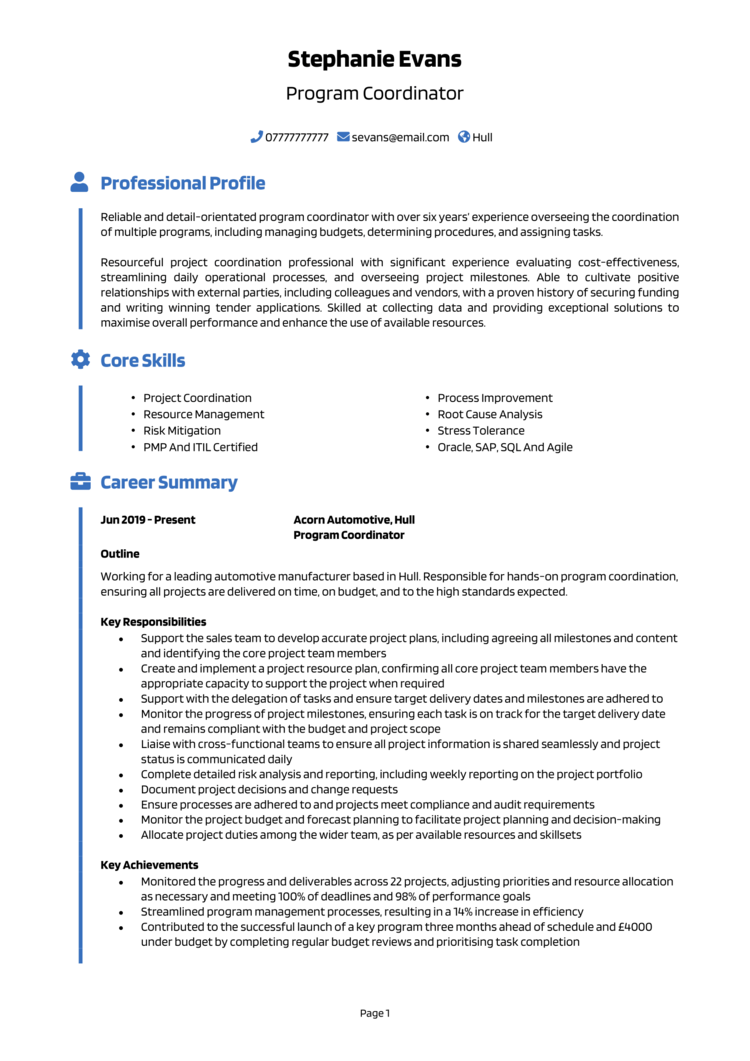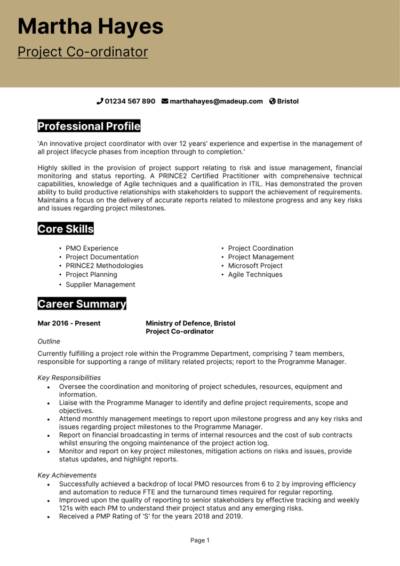A great project coordinator keeps everything running smoothly – juggling deadlines, managing resources, and making sure tasks don’t fall through the cracks. Without you, projects would descend into chaos faster than a poorly planned event with no RSVP list.
This guide and its Project Coordinator CV examples will show you how to build a CV that highlights your coordination skills and knack for keeping projects on schedule – so you can land the job with ease.
Project Coordinator CV example

Program Coordinator CV example

How to write your Project Coordinator CV
Learn how to create your own interview-winning Project Coordinator CV with this simple step-by-step guide.
Writing a CV is just like any well-planned project – everything should be in the right place, easy to follow, and designed for success. If recruiters can’t quickly find what they need, your application might not make it to the next stage.
This guide will take you through how to format your CV, showcase your most relevant skills, and demonstrate your experience in a way that proves you’re the best person to keep any project on track.
How to create a good structure for your Project Coordinator CV


When managing a project, you ensure that everything is clear and easy to track – your CV structure should be no different. Hiring managers need to quickly identify your key strengths, so keeping a logical layout is essential to best convey your skills.
Here’s the structure you should follow:
- Name and contact details – Personal details sit at the top, along with an optional photo of yourself, so employers can reach you easily.
- Profile – Start strong with a brief introduction that highlights your project coordination expertise, organisational skills, and problem-solving abilities.
- Core skills – Bullet point your most relevant abilities, such as scheduling, stakeholder communication, and risk management.
- Work experience – A structured list of your previous roles, focusing on key achievements and responsibilities.
- Education – Show off your academic qualifications and relevant training, from degrees to certificates..
- Additional info – Optionally, mention the software proficiencies, awards, and hobbies that make you stand out for the role.
Project Coordinator CV format


A disorganised CV won’t give employers much faith in your ability to coordinate complex projects. If your CV format looks more like an overcomplicated project spreadsheet than a smooth Gantt chart, it’s time for a redesign
Follow these formatting tips:
- Bullet points – These let recruiters pick out the key bits with ease.
- Divide sections – Making the information easy to navigate with clearly-defined sections is important.
- Use a clear and readable font – Along with an appropriate colour scheme, ensure your font is easy for the recruiter to read.
- No more than 2 pages – Aim for 2 pages: too long would start to bore the recruiter, and this is plenty of space to list the important details
Creating your Project Coordinator CV profile


Your CV profile should be a strong opening statement that immediately tells employers why you’re the right fit for the role. It’s like a project proposal – it needs to grab attention, highlight key strengths, and convince them you’re the right person for the job.
Project Coordinator CV profile examples
Profile 1
Organised Project Coordinator with four years of experience supporting project teams in planning, scheduling, and resource management. Skilled in coordinating tasks, tracking project milestones, and liaising with stakeholders to ensure timely delivery. Proficient in Microsoft Project, Trello, and Jira for workflow management. Passionate about driving efficiency and ensuring seamless project execution.
Profile 2
Detail-oriented Project Coordinator with three years of experience in construction and infrastructure projects, specialising in budget tracking, documentation, and stakeholder communication. Adept at risk assessment, progress reporting, and managing project timelines. Experienced in using Primavera P6 and Smartsheet to monitor project workflows. Dedicated to ensuring projects are delivered on time and within budget.
Profile 3
Experienced Project Coordinator with over six years of expertise in IT and software development projects, focusing on Agile methodologies and cross-functional team collaboration. Skilled in sprint planning, issue tracking, and maintaining project documentation. Proficient in Asana, Jira, and Confluence. Committed to improving productivity and aligning teams with business objectives.
What to include in your Project Coordinator CV profile
You should include:
- Project coordination experience – Have you worked in construction, IT, marketing, or business operations? Tailor this to the role.
- Your organisational strengths – Highlight your ability to manage schedules, allocate resources, and keep projects on track.
- Key software expertise – Employers love candidates proficient in project management tools like Asana, Trello, or Microsoft Project.
- Problem-solving skills – Demonstrate your ability to anticipate and resolve issues before they derail a project.
- Stakeholder communication – Project coordinators need to liaise between different teams, so showcase your ability to keep everyone aligned.
Core skills section


Your core skills section is like a project summary – a quick and clear way to showcase the key strengths that hiring managers want to see.
The best part? This section is very easy to personalise. Tailor your CV skills to the specific role, ensuring that it reflects the employer’s needs. If the job is heavily focused on budgeting, highlight financial management. If it’s more about stakeholder coordination, emphasise communication and leadership skills.
What are the most important skills for a Project Coordinator CV?
- Project Planning and Scheduling – Developing timelines, setting milestones, and coordinating tasks to ensure project deadlines are met.
- Task and Resource Allocation – Assigning responsibilities and managing resources efficiently to optimise productivity.
- Stakeholder Communication – Liaising with clients, team members, and management to provide updates and gather requirements.
- Budget Tracking – Monitoring project expenses and ensuring costs stay within the allocated budget.
- Risk Assessment and Mitigation – Identifying potential risks and implementing strategies to minimise their impact on project progress.
- Project Documentation – Maintaining records, reports, and meeting notes to track project developments and decisions.
- Collaboration and Team Coordination – Working closely with different departments to align goals and streamline workflows.
- Project Management Software Proficiency – Using tools like Asana, Trello, Microsoft Project, or Jira to track progress and manage tasks.
- Quality Control and Assurance – Ensuring project deliverables meet required standards and client expectations.
- Reporting and Performance Analysis – Evaluating project success through key performance indicators (KPIs) and post-project assessments.
Work experience


Saying you have great coordination skills is one thing – showing how you’ve used them in real projects is what really matters. Employers want to see how you’ve successfully managed tasks, coordinated teams, and kept projects moving forward: your work experience does just that.
List your roles in reverse chronological order, ensuring each entry is structured with bullet points. If you’re transitioning from a different role, highlight transferable skills such as time management, problem-solving, and teamwork.
How to structure jobs

- Outline – Introduce the company, your role, and the types of projects you coordinated.
- Responsibilities – List your key tasks, such as scheduling, risk management, and stakeholder coordination. Use action verbs like “managed”, “coordinated”, and “streamlined”.
- Achievements – Highlight measurable outcomes, such as delivering projects on time, reducing costs, or improving workflow efficiency.
Work history examples for a Project Coordinator
Project Coordinator | BrightPath Consulting
Outline
Managed project timelines and coordinated resources within a management consulting firm, ensuring effective stakeholder communication and successful project delivery across multiple industries.
Responsibilities
- Created and maintained project schedules using Microsoft Project and Trello.
- Tracked project progress, identifying potential delays and implementing mitigation strategies.
- Coordinated meetings, prepared minutes, and ensured action items were followed up.
- Managed project documentation, ensuring version control and compliance with company standards.
- Communicated with internal and external stakeholders to align project objectives and expectations.
Achievements
- Reduced project delivery time by 15 percent through improved scheduling and workflow optimisation.
- Developed a project tracking system that improved reporting accuracy and efficiency.
- Recognised by senior management for exceptional coordination and problem-solving skills.
Project Manager | BuildTech Solutions
Outline
Supported large-scale construction projects within a civil engineering and construction firm by managing documentation, liaising with contractors, and ensuring project milestones were met on schedule.
Responsibilities
- Maintained project timelines and ensured all tasks were completed within set deadlines.
- Coordinated with suppliers and contractors to manage material deliveries and site logistics.
- Assisted in budget tracking and prepared financial reports for senior management.
- Conducted risk assessments and updated project plans accordingly.
- Prepared detailed project reports and presented progress updates to stakeholders.
Achievements
- Helped reduce procurement delays by 20 percent by optimising supplier communication.
- Improved project tracking accuracy, leading to better resource allocation and efficiency.
- Played a key role in ensuring a £5M infrastructure project was completed ahead of schedule.
Program Coordinator | TechSphere Innovations
Outline
Managed IT and software development projects within a technology company, ensuring smooth collaboration between developers, designers, and business teams to deliver high-quality digital solutions.
Responsibilities
- Facilitated Agile ceremonies, including sprint planning, daily stand-ups, and retrospectives.
- Monitored project progress using Jira and ensured timely resolution of blockers.
- Maintained project documentation, including roadmaps, timelines, and risk assessments.
- Coordinated with cross-functional teams to align project goals with business priorities.
- Provided regular updates to stakeholders and senior leadership on project status.
Achievements
- Improved sprint efficiency by 25 percent through better backlog management and prioritisation.
- Successfully launched a major software update that increased user engagement by 30 percent.
- Recognised for streamlining communication between development and business teams.
Education section


While experience often carries more weight in project coordination, relevant education still helps establish credibility.
If you have a degree in Business, Project Management, or a related field, list it here. Also, highlight any certifications in project management methodologies such as PRINCE2, Agile, or PMP. List them all with the newest ones first.
Qualifications recruiters look for in a Project Coordinator
- PRINCE2 Foundation/Practitioner Certification – Highly valued in structured project environments.
- PMP (Project Management Professional) Certification – A globally recognised qualification for project professionals.
- Agile Project Management Certification – Useful for roles in IT, software development, and fast-moving industries.
- Scrum Master Certification (CSM/PSM) – Beneficial for working in Agile-led projects.
- Degree in Business or Project Management – A solid foundation for understanding project workflows and coordination.





